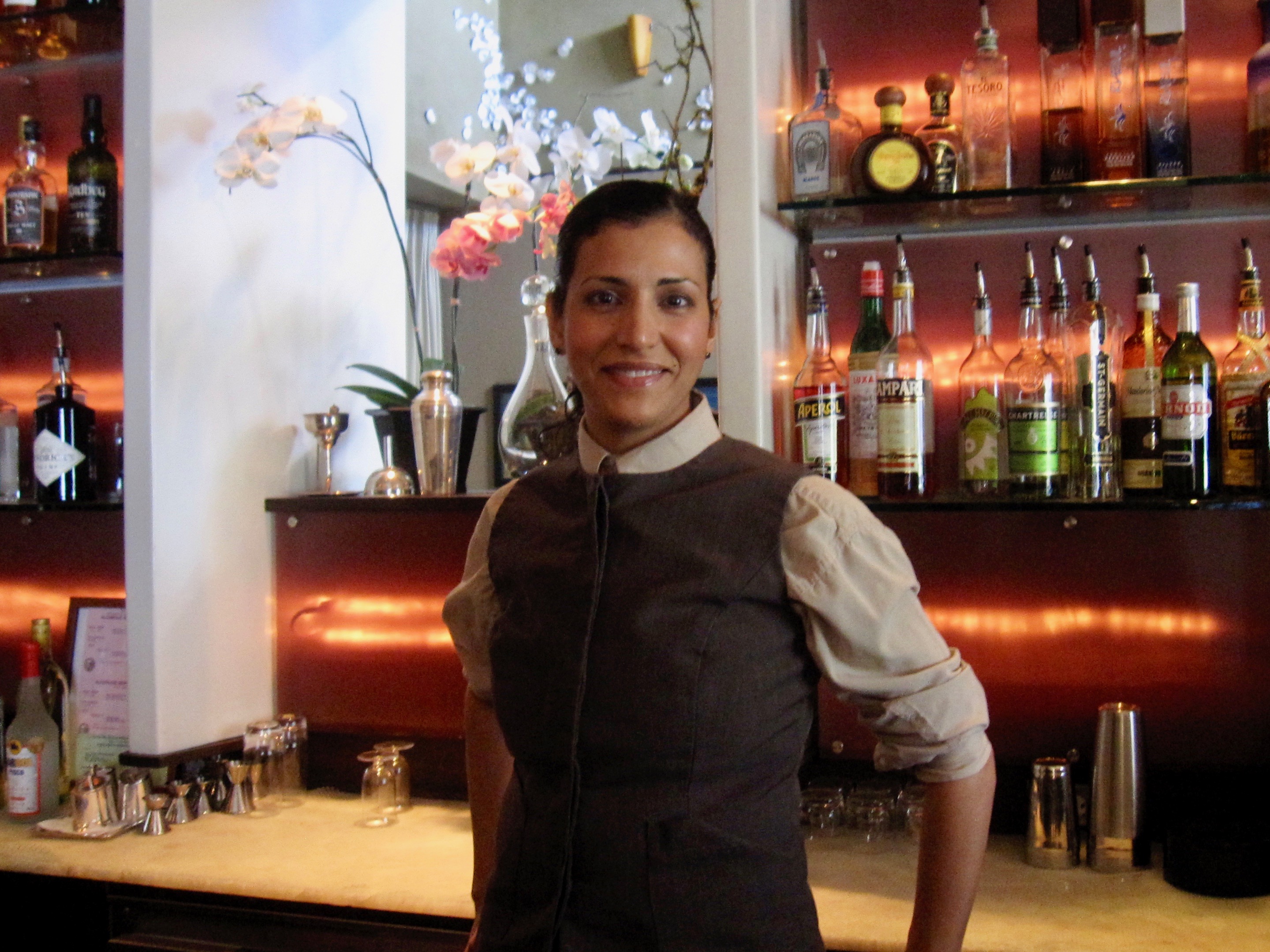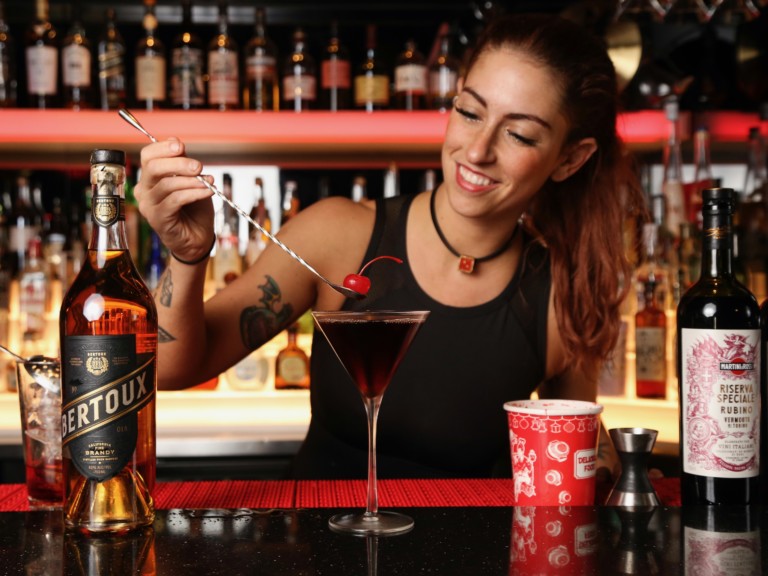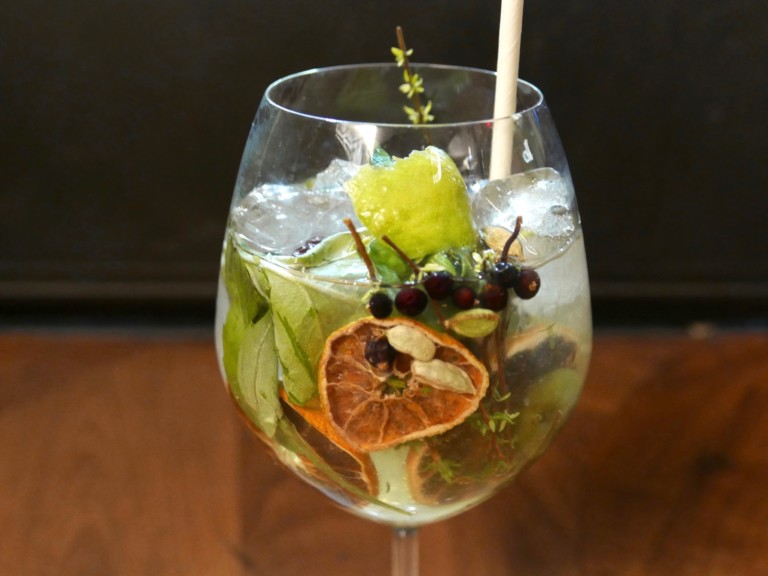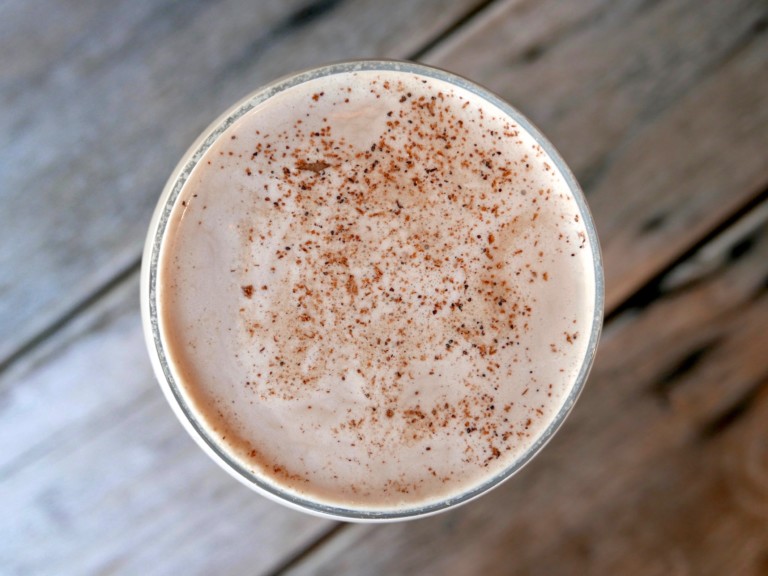Zahra Bates is a seasoned bartender, but still sees every day as a learning opportunity. She draws inspiration from fellow bartenders and mixologists, Providence customers, and by wandering the farmers markets…and when she can’t find what she needs, she makes it herself. We recently met in the bar of L.A.’s most revered seafood restaurant, where Bates discussed her background and approach.
Would you consider yourself a bartender or mixologist?
Generally, I like to think of myself as a bartender, but since mixologist is the older term, and kind of traditional, I think of myself as a mixologist too.
What’s the difference?
For me, a mixologist is somebody who looks at all – “ologist” is a term that means the scientific study of – so the study of mixing. Based on that – since I have a minor in linguistics – it would be learning and understanding about what goes into mixing. That’s important to me, but bartending’s important, because you need to have social skills and you have to be able to intuit what a person might want, whereas they might not know what they want and you have to interpret what they really wanted. Things like that. So bartending is just as important as mixing, so I like to think of myself as both.
Minor in linguistics. What was your major?
English Lit.
Where did you go to school?
In London, at Westminster University.
Do you think either of these degrees helps you in what you’re doing now?
Oh, definitely. You draw on every aspect of yourself when you’re communicating with other people. You try and approach them in different ways. English Literature really helped me to cultivate that side of side of myself, lets me look at things objectively, and through Linguistics, subjectively. They both kind of really help me work with the human being. I think that’s what literature does.
What is it about cocktails that inspire you?
The art. It’s artistic and a way of expressing yourself. It’s also a way of connecting with other people.
What do you think differentiates what you do here from other programs around Los Angeles?
Every person is unique, so I guess I have a unique twist just based on that, but overall, as long as the drink tastes good, you’re doing good things. Maybe it’s just the individualistic aspect of it. We have a lot of great drinks here and have a great cocktail culture, thankfully.
What are some hallmarks of a Zahra Bates cocktail?
For me, I guess this is due to my London training: balance. For me that’s the most important thing when it comes to a cocktail, that it hits every part of your palate. That’s what I aim for when I make a cocktail. I may not always achieve it, but that’s what I aim for.
What’s the most recent cocktail that you’ve been developing, and what has your approach been?
I’ve been working on a cocktail that’s kind of like a twist on a daiquiri, but there’s no rum in it, and there’s no sugar in it. It’s a tequila based cocktail, a reposado and it has cherimoya in it, and celery bitters, and lime, obviously, and the sweetening aspect is yellow chartreuse, and that draws out the highland characteristic of the tequila that I’m using.
What’s the tequila?
It’s called Riazul, and it’s a highland tequila that has a high mineral content. They put it on a really high part of the mountain, so it really strains the fruit. So it’s struggling to survive, which adds more sugar content, which really affects the tequila.
Do you have a name for that one?
Not yet, but I’m thinking of something to do with Mark Twain because he thought that the cherimoya was the greatest fruit that ever existed. I haven’t decided on an exact name yet.
What’s your first cocktail memory?
Probably when I was working at the Hard Rock Café. That was in 1991, a very long time ago. I was only 19 at the time, so I wasn’t allowed to drink them, but I kept seeing all these great colorful exotic things going out of the bar, and all the bartenders always seemed to be having such a good time. It was mainly guys back there at the time. There was one girl, generally, behind the bar. I always thought, “I want to be that girl.”
How did you go from that moment to working with cocktails?
I went from there to Chateau Marmont, at Bar Marmont. I just bugged the management. Just about every single day, “Put me behind the bar,” until they finally gave in and said, “You have two weeks. If you don’t work out, and you can’t make it back there, you’re out.” I went back there and the first night I was awful, absolutely awful. I knew kind of how to make the drinks because I would talk to the bartenders pretty much every day, but I didn’t know how to interact with the guests or how to pay attention to how people sat at the bar, so I knew who to go to first. By the third day, after asking all the bartenders for advice, I was good enough to make it to the well and make the drinks there, but not deal with the guests yet. Then by the time it got to two weeks, they said, “Okay, you’re in.” That was my first bartending job.
If you could give a bartender one piece of advice on their first day, what would it be?
Be prepared. Do your research. Ask a lot of questions beforehand. Be as prepared as you can be. You’re not going to first day, and don’t let that dissuade you.
After Chateau Marmont, where did you go?
I was at the Chateau for five-and-a-half years, and then moved to London. After five-and-a-half years of bartending, I thought, “Yeah, I know what I’m doing,” so I went to London. I had gone there for my education, but also heard they were doing some great drinks over there. I applied at The Lab, because I heard it was the best place in town. I worked at Bar Marmont, and that was the best place in L.A. They just laughed at me. There you have to be bartending for at least ten years before they even look at your resume. After they laughed at me, I asked them where they think I should go, and they recommended a place called 57 Jermyn Street, which was a member’s only club, and at the time was the style of bartending I was good at, but had a few twists and turns. They used fresh lime and lemon juice, and other fresh ingredients, and they helped me learn and get ready for my next job. I ended up going to the Sanderson Hotel, which at the time was an Ian Schrager hotel. I went to that bar and that’s where I really got an education.
What did you learn there?
Everything. That’s where I learned the importance of knowing your base spirit, knowing not just how it tastes, but how it’s made. Based on that ideology, it can help you in building your cocktail. The guys who worked there, they ended up starting a company called Create Cocktails. They used to do these things called “Cocktail Heaven,” where they would have people come in and do their drinks that they would teach them. It would just be people on the street, but I would go to those too. The more I learned, the more I realized I didn’t know anything. Every day is like that, still.
Would you say that you have any cocktail mentors?









Blog Comments
TERRY MAYS
December 15, 2011 at 6:07 PM
what is Zahra Bates recipe for the BLOODY MARY TOMATO
OR does Zahra have a Mixologist Recipe book that she might be putting on the market
I love her cocktails she creates
Table 20′s 2nd Annual LA’s Best Bartender Contest: Interview with Judge Matthew Biancianello « The Minty
August 26, 2011 at 5:19 PM
[…] It’s more like I have favorite bartenders. I love drinking at Providence and watching Zahra [Bates] work. I’ll drink whatever she’s making. At home, I’d smoke a cigar and drink […]
Columbine Quillen
February 26, 2011 at 1:45 PM
Inspiring. Thank you for the interview!
Bartending – an in Demand Occupation-business
August 14, 2010 at 12:29 PM
[…] Food GPS » Q&A with bartender-mixologist Zahra Bates (Providence) […]
cna training
July 29, 2010 at 8:44 AM
My cousin recommended this blog and she was totally right keep up the fantastic work!
Tweets that mention Food GPS » Q&A with bartender-mixologist Zahra Bates (Providence) -- Topsy.com
July 6, 2010 at 10:19 AM
[…] This post was mentioned on Twitter by Caroline on Crack. Caroline on Crack said: I love @zxenos! RT @foodgps: Q&A with bartender-mixologist Zahra Bates (Providence)http://su.pr/2HNBOn […]
Bartending For Beginners.
July 3, 2010 at 9:37 AM
[…] Food GPS » Q&A with bartender-mixologist Zahra Bates (Providence) […]